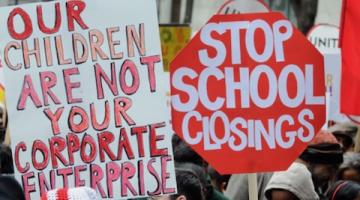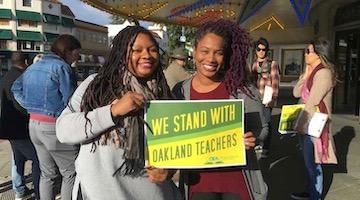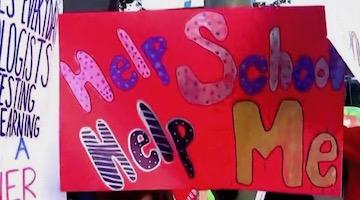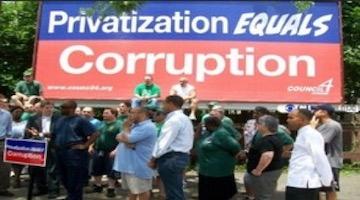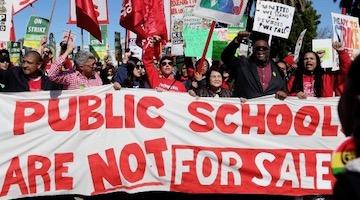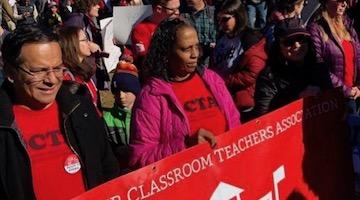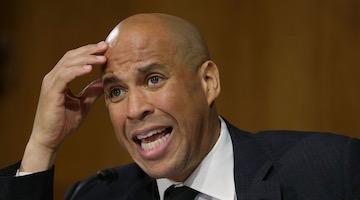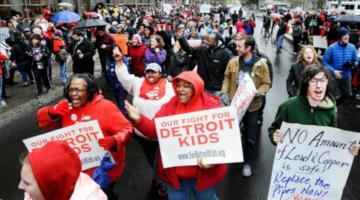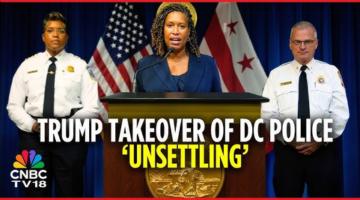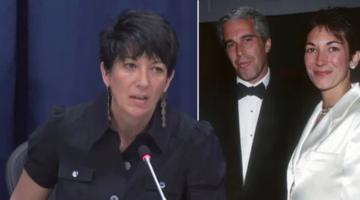“Trump’s treatment of Puerto Ricans as “third world class” citizens will also be reflected in the school and housing conditions available to Puerto Ricans arriving in Florida.”
As the Puerto Rico disaster unfolds before our horrified eyes, shortages of water, food, housing, medicine, and healthcare threaten countless lives. As of October 13, 2017, 30,000 Puerto Ricans have arrived at the Orlando International Airport -- which has established a disaster relief center to aid incoming islanders who are hungry, thirsty, and need essential living assistance. Florida has taken other steps towards welcoming Puerto Ricans to the state as well. After all, the Sunshine State is already home to over one million Puerto Ricans, right? Already embroiled in widespread class bludgeoning and racial engineering tactics, the state is ill-prepared to meet this historic humanitarian challenge as it already faces job, housing, food, healthcare, and quality education shortages. Governor Rick Scott’s publicly funded services -- like education, food stamps, and Medicaid programs -- are like Trump’s Puerto Rico paper towel toss: grandstanding displays, with zero substance, that brazenly and condescendingly reward almost randomly fortunate recipients. Let them eat paper towels!
During any crisis, one urgent necessity -- amongst a list including food, water, shelter, clothing, hygiene and medical care -- is to provide educational continuity to students of all ages. For families undergoing the magnitude of the dual tragedies Irma and Maria, education provides a semblance of stability and normalcy in such an emotionally and physically traumatic time. To this end, Governor Rick Scott has declared a state of emergency in Florida and is cooperating with school officials’ requests to waive certain kinds of paperwork -- like transcripts, immunization records, birth certificates, teachers’ certifications -- to ease school enrollment and teacher hiring processes. Scott has also announced in-state tuition for newly arriving college students and 20,000 openings for island and mainland students in the web-based public school, The Florida Virtual School.
“The state remains mute on guaranteed funding allocations for schools most impacted by increased post-Maria student populations.”
But the Generous Education Governor Scott is not. All of these offerings help, however, the state remains mute on guaranteed funding allocations for schools most impacted by increased post-Maria student populations. Indeed, Trump’s treatment of Puerto Ricans as “third world class” citizens will also be reflected in the school and housing conditions available to Puerto Ricans arriving in Florida.
As it is abysmal to hear President Trump tweeting about Puerto Rico’s debt as people are starving and dying, it is equally abysmal to watch how adequate learning conditions for new Puerto Rican students will be mired in the same money battles already raging in Florida’s highly politicized education circles. As Florida politicians take a different official position on Puerto Rico aid than Trump, they are certain to be as offensively opportunistic about Florida’s growing Puerto Rican population as Trump is outwardly racist about aiding the island’s recovery.
World Class Education?
In an October 5, 2017 Miami Herald article, Governor Scott is quoted as saying that Florida’s public schools offer a “world class education.” Ha! Anyone following the state’s education budget battles has to laugh at this statement. The recent controversial HB 7069, which seeks to undermine local school board autonomy to favor new charter schools, shows that one of Scott’s strongest pro-charter selling points is that the public schools are failing students and need to be rapidly replaced by corporate-owned charter franchises. But intersect charter industry greed with the post-Maria demand for generous, open-armed humanitarian appearances, engendered by Florida’s new Puerto Rican arrivals, and we now have Florida public schools celebrated as world class institutions. What’s next? New Scott campaign ads featuring his tour of central Florida public school classrooms to the tune “We Are the World”?
A serious and very real political threat accompanies the innocent arrival of new Puerto Rican students to Florida schools: their parents can vote. New Florida legislation, HB 7069, which is being legally challenged by 14 school districts throughout the state, sanctions an unprecedented wealth transfer from public to charter schools as part of its “Schools of Hope” program. Now, Florida has a moral mandate to utilize all available education infrastructural resources. To the behest of many, the figurative allusion to a hopeful chartered future is now literally embodied in Puerto Rican survival, which includes education.
“If politicians continue on this anti-public school warpath, they risk angering Puerto Rican families.”
People like Rick Scott, and other political architects of HB 7069, are caught in a hand-wringing paradox. If politicians continue on this anti-public school warpath, denying resources to low income schools through HB 7069’s Title I budget cuts and public wealth transfers to charter schools, they risk angering Puerto Rican families, their children’s school teachers, and sympathetic administrators. This will influence voting -- a looming concern.
We see this dilemma expressed in the recent activity of HB 7069 architect, Florida Representative Manny Diaz. He is the Chief Operating Officer for a junior college managed by Academica, one of Florida’s largest for-profit charter school management companies. At the same time, he voted for a $14M cut to Miami Dade College, a public college attended by many in his constituency.
Flash forward to today’s post-Maria political climate, which is filled with contradictions. Diaz’s strategy has him waving a pro-charter school flag with one hand and a Puerto Rican flag with the other hand. He was a lead author in a recent letter to the Florida Department of Education (DOE) requesting a sensible funding formula for county school districts accepting new students. As duplicitous as his interests are, Diaz is correct to note the inadequate and arbitrary nature of this proposed funding formula.
The DOE is numerically random about how funding will be allocated in these conditions. For example, according to the Miami Herald, the current approved formula has public schools receiving extra funding this fall if they take in a “set number of displaced Puerto Rican children.” This number must increase district enrollment by “at least 5 percent or a single school's enrollment by at least 25 percent.”
“Diaz’s strategy has him waving a pro-charter school flag with one hand and a Puerto Rican flag with the other hand.”
You can see how HB 7069 cheerleaders, like Diaz, will express problems with this funding formula -- as it directly affects their Puerto Rican voting constituencies. For example,
Diaz represents the state's largest school district, Miami-Dade County Public Schools, which had spring enrollments of 353,000. The district would have to register 17,700 new Puerto Rican (and others fleeing disaster areas) students to attain much needed extra funding. Hillsborough County Public Schools is the state's third largest school district. With 211,000 students in the 2016-2017 school year, 10,500 new students will get them extra funding under this random formula.
Diaz is asking for clarifications here, as some individual schools will grow significantly strapped without extra funds. Given his power in education privatization circles, it will be important to watch these cross-purpose interests clash and undermine each other as politicians’ personal financial portfolios come into direct conflict with their political futures.
One other significant request is that new Puerto Rican students be counted in the fall enrollment survey that determines critical calculations about how state money is allocated during the school year. Instead of including the new students in the fall survey, the DOE plans to do an alternate survey near mid-December. Dodging higher enrollment numbers in a year shaping up to be a major education battle, as HB 7069 is reviewed in court, the DOE will surely attempt to skirt financial responsibilities (while whistling “We Are the World” all the while).
Housing: The Flip-Side of Schooling
As we know, schools provide important practical resources and emotional support when students’ families struggle with housing and hunger issues. Let’s face it: for many students, school is a sanctuary from precarious living conditions. But it is also difficult for students to attend regularly, do homework, study, and achieve good grades when they are homeless or live in overcrowded temporary shelters and homes. An October 2017 study by the University of Florida and Miami Homes for All cites central Florida as harboring the highest number of homeless students in the state. Paralleling the increase of relocated Puerto Ricans, Florida’s number of homeless children has doubled since 2000. Orlando’s Orange County has seen a nearly 300 percent increase in homeless students since 2007 -- not including recently relocated students. Overall, the state had 72,601 homeless students in the 2015-2016 school year, up from 33,889 since 2007. Twelve thousand of these students are in central Florida. Since the study highlights a strong link between homelessness and poor grades, permanent low-income housing, housing vouchers, and other innovative efforts will provide a necessary backbone for Puerto Rican families arriving in Florida.
Think about it: what good is it to publicize the Florida Virtual School option when power is out on the majority of the island, and mainland students must have secure internet access to attend virtual classes? An empty gesture, indeed -- like Trump’s paper towel giveaway.
All of these unanticipated developments complicate the political terrain for Scott, Diaz, and other Florida politicians. If they are banking on the overt gestures of accommodation to distract from the upcoming court battle over HB 7069, and general social conditions -- good luck. This won’t work. It’s all the same duplicity, money, empty rhetoric, and people running Florida’s education (and housing) shows. And people will continue to be tired of these grabs, whether it's privatizing forces on the island or the ongoing attack on mainland Florida’s affordable housing and public school infrastructures.
Michelle R. Matisons is an adjunct Philosophy professor and writer living in the Florida panhandle. She can be reached at michrenee@gmail.com.


